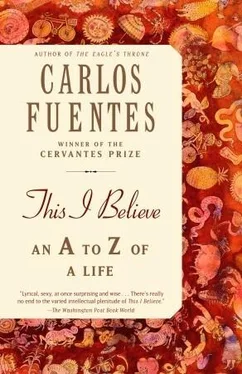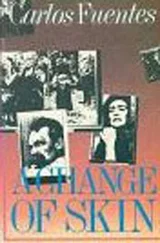Like a grand opera, The Wild Ass’s Skin opens with a first act that unfolds in a gambling house, a place where monetary things are lost and won from one moment to the next. In the second act, which takes place in a money-lending house, a talisman saves Raphael from financial ruin. The third act is a prolonged orgy of property and death in which Raphael wins and then loses everything he has, all because of the magical object that he possesses and that possesses him.
Balzac’s genius resides in the tension between time and space in his novels. In The Wild Ass’s Skin, the skin itself is the symbolic narrative space. Raphael desires things, and the object-space grows smaller and smaller with each successive wish. But right along with the space, his time runs out as well. The hero’s will is annihilated by the fulfillment of his desires. There are few moments in fiction quite so terrifying — and absurd — as the moment when the banker asks him, “Do you want some asparagus?” to which the terrified Raphael cries out, “I want nothing!” Or later on, when he lashes out at the solicitous manservant, Jonathas, “Monster! Have you sworn to bring about my death?”
In this desperate novel, time and space, possession and dispossession, life and death become fused together amidst erotic passion. Sex is practically invisible in Balzac: Raphael desires the body of the courtesan Foedora but prefers the wild ass’s skin to the skin of Eros. Sexual desire could destroy the skin and thus destroy Raphael’s life. In Freudian terms, the wild ass’s skin would be the proof of a “triumph over castration.” It also possesses the fetishistic quality of being unknown and, as such, permissible. Nobody prohibits Raphael from keeping the skin because the object’s price is unknown. Nobody, in other words, can prohibit Raphael from being the owner of his own death.
The erotic surprise of this particular Balzac novel comes when we discover that sexual plenitude has been reserved exclusively for Pauline, the purest of heroines. This virginal woman of populist melodrama conceals and demands the most complete sexual surrender, and Raphael exhausts his destiny in his desire for her. The wild ass’s skin disappears and he dies — in a horrific final scene — gnawing at Pauline’s breast. It is not the cruel Foedora, but the sweet Pauline who kills Raphael because she cannot allow him to live without desiring her — or, in other words, she cannot allow him to die without desiring her. Separating Raphael’s dead body from Pauline’s breast proves to be an arduous task, for our hero continues to cling to her like a ferocious beast.
Two other works by the visionary Balzac have always struck me as particularly disturbing. In Séraphita, the he/she protagonist, who is sometimes a man, sometimes a woman, or rather half-man and half-woman, makes sexual ambiguity an unattainable and thus infinitely and hopelessly coveted object of desire. Wilfrid’s longing for Séraphita is as unattainable as Minna’s longing for Seraphitus. Wilfrid, in his desire for the woman Séraphita, runs the risk of finding himself in the arms of the man Seraphitus, and in the same way Minna may find herself embracing the body of the woman Séraphita. Once again, the Tantalus myth illuminates Balzac’s fantastic iconography, and Mme Potocka, one of the writer’s refined lovers and correspondents, is absolutely right when she tells him that with regard to Séraphita one must think in terms of a “creation” and not a “creature.” How can Wilfrid or Minna possess such a person if they do not understand that this is someone who is neither man nor woman but rather a creation in the fullest sense, a creation which demands that they — and every lover — surrender unabashedly to the movement of a soul in which we — characters and readers alike — risk our lives? This, we might say, is the difference between Séraphita and Orlando, the very lovely and innocent novel by Virginia Woolf, which plays such marvelous games with the constant metamorphoses of time and sex. But Woolf does not ask us to choose, nor does she choose anything herself. Orlando travels seamlessly through time, alone. Séraphita demands that we be something that we don’t want to be, while at the same time we fervently desire to be either Him or Her. Séraphita demands that we give up life so that we may possess it beyond the realm of sex. Séraphita demands eroticism.
Louis Lambert, Balzac’s most autobiographical novel, offers another illuminating prophecy. The young and brilliant Lambert is, in the words of Balzac, “a soul crushed under the weight of thought.” Flaubert was wrong when he read it as a nightmare and judged it to be the story of a madman. As mad as Nietzsche, because this Louis Lambert, even when locked away in a darkened room without uttering a word, is not mad. He has been defeated by the velocity of his thoughts, which move so fast that he is unable to express them verbally. Thought annihilates the thinker. Louis Lambert, then, is the most astounding harbinger of Friedrich Nietzsche.
Can literature defeat death? This is Balzac’s insidious question, and it accompanies many of his characters: Lucien de Rubempré and Eugène de Rastignac in their ambitious ascent of the social ladder; Père Goriot, the modern-day Lear who is victimized by the cruel vanity of his ungrateful daughters; Cousin Bette, who hatches her sinister plot so that vengeance may finally liberate her from the humiliation she has endured; and the great puppeteer of The Human Comedy, Vautrin — Abate Herrera/Collin/Trompe-la-Mort — who manipulates everyone else’s fate so that he himself may avoid confronting his own unbearable burden: his own destiny. These characters live in the company of ghosts, though none quite so intensely as Colonel Chabert, when he introduces himself in the home of his wife, who has remarried, having believed him to be dead. “Colonel Chabert,” he says. “He who was killed at Eylau.”
In response to a letter from the Duchesse d’Abrantes in which the noblewoman chastized Balzac for not coming to visit her often enough at her country home, the novelist simply replied, “Please don’t blame me. I work night and day. You may be shocked, rather, by the fact that I am not yet dead.”
The skin shrinks, but the novel grows. Balzac has given death a name. He has seen that possession gives life, but in the end takes it away. Yet he has only been able to do so insofar as he has been able to identify his novel as a text, a verbal structure that gives permanence and content to all the things that resist having permanence and content — that is, the brevity of life and material possessions.
Socrates knew that he was ugly and prayed for “inner beauty.” I cannot think of a more accurate disposition for judging “the beautiful”: to ask the body to guide us toward the soul and to ask the soul to help us understand the possibility of harmony between body and spirit. The question of how body and soul relate to each other is implicit in our lives. Are they inseparable? Divisible only by madness and death? Does the soul outlast the body or do the two die together, locked in a mutual embrace?
Ugliness is body without form. The artist tries to assimilate and assemble all that is disparate. The theme — pain, death, birth, revolution, power, pride, vanity, dream, memory, or will — is irrelevant. What inspires the body is irrelevant as long as it gives the body form, because then the body can no longer be ugly, and we discover that Socrates was right. Beauty belongs exclusively to the person that perceives it, not to the person who possesses it. Beauty is nothing more than the truth within each and every one of us. The truth and beauty of bodies as well as the truth and beauty of games, dreams, solidarity, the attention we devote to people and things, food and drink, poem and song, memory and imagination, the beauty of nature, death, and the mystery of day and night.
Читать дальше












